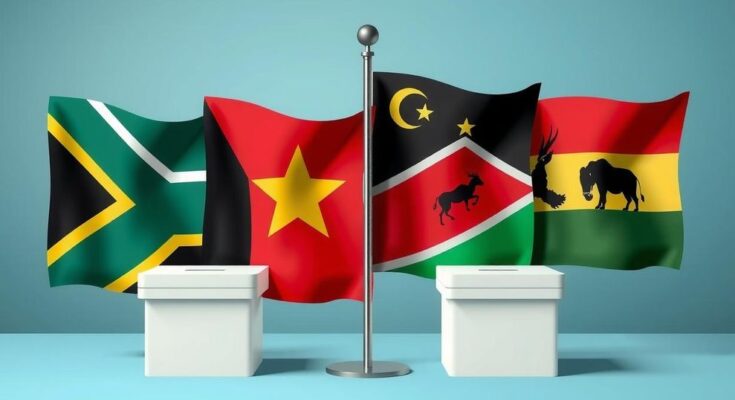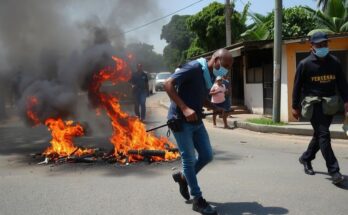Recent elections in Southern Africa demonstrate notable political shifts across South Africa, Botswana, Mozambique, and Namibia, reflecting public demands for change and accountability. South Africa’s ANC lost its majority, necessitating a coalition government, while Botswana saw the UDC rise amidst economic dissatisfaction. In Mozambique, Frelimo retained power amid controversy, and Namibia reasserted SWAPO’s dominance despite calls for reform. The results indicate a desire for political renewal driven by younger, discontented voters across the region.
The recent elections in Southern Africa, specifically South Africa, Botswana, Mozambique, and Namibia, highlight significant political shifts and demands for renewal across the region. Each country showcases unique characteristics that deviate from the overarching theme of a generic political change. South Africa’s ruling party, the African National Congress (ANC), recently lost its majority for the first time since the end of apartheid, prompting a coalition government—a move perceived by some analysts as a sign of political transformation in the region dominated by former liberation movements. In Botswana, the historical dominance of the Botswana Democratic Party (BDP) was challenged by the Opposition Umbrella for Democratic Change (UDC), reflecting public dissatisfaction over economic stagnation and social inequality. The new leadership faces urgent challenges in addressing unemployment and dependency on diamond revenues.
Conversely, in Mozambique, the ruling party, Frente de Libertação de Moçambique (Frelimo), retained power amidst allegations of fraud and violence, creating a robust opposition demanding change. The political landscape appears turbulent for Mozambique, with rising unrest reflecting broader demands for social justice. Meanwhile, Namibia’s elections reaffirmed the SWAPO party’s longstanding control, although a female candidacy represents a potential shift in political dynamics. Despite varying outcomes, the region witnesses an increasing demand for political accountability and economic reform, driven largely by a younger, dissatisfied electorate.
These elections indicate the old liberation movements’ struggles to connect with younger generations who prioritize socio-economic issues over historical narratives of liberation. As dissatisfaction grows among the populace due to poverty, unemployment, and corruption, ruling parties must adapt to the evolving political landscape or risk losing their grip on power.
The elections in Southern Africa serve as a critical juncture in understanding the political dynamics within a region traditionally governed by liberation movements post-colonization. Historically, these movements, like the ANC in South Africa or Frelimo in Mozambique, have relied on their liberation narratives to maintain power. However, recent electoral outcomes suggest that citizens, particularly the youth, now prioritize tangible socio-economic improvements above historical achievements. The political atmosphere in countries such as Botswana and Namibia illustrates a call for change amidst deep-rooted inequalities and governance concerns, highlighting the urgent need for political renewal.
In summary, the electoral results across Southern Africa reveal a pronounced demand for political change and accountability, particularly among marginalized populations. The shifts in power dynamics, especially in South Africa and Botswana, indicate a potential decline of traditional liberation movements’ dominance, compelling them to address socio-economic grievances. As new political figures arise, the necessity for these leaders to engage with younger, urban voters is paramount. The overall progression suggests a region on the brink of significant transformation, necessitating responsive governance to meet the evolving needs of its populace.
Original Source: www.fairobserver.com




